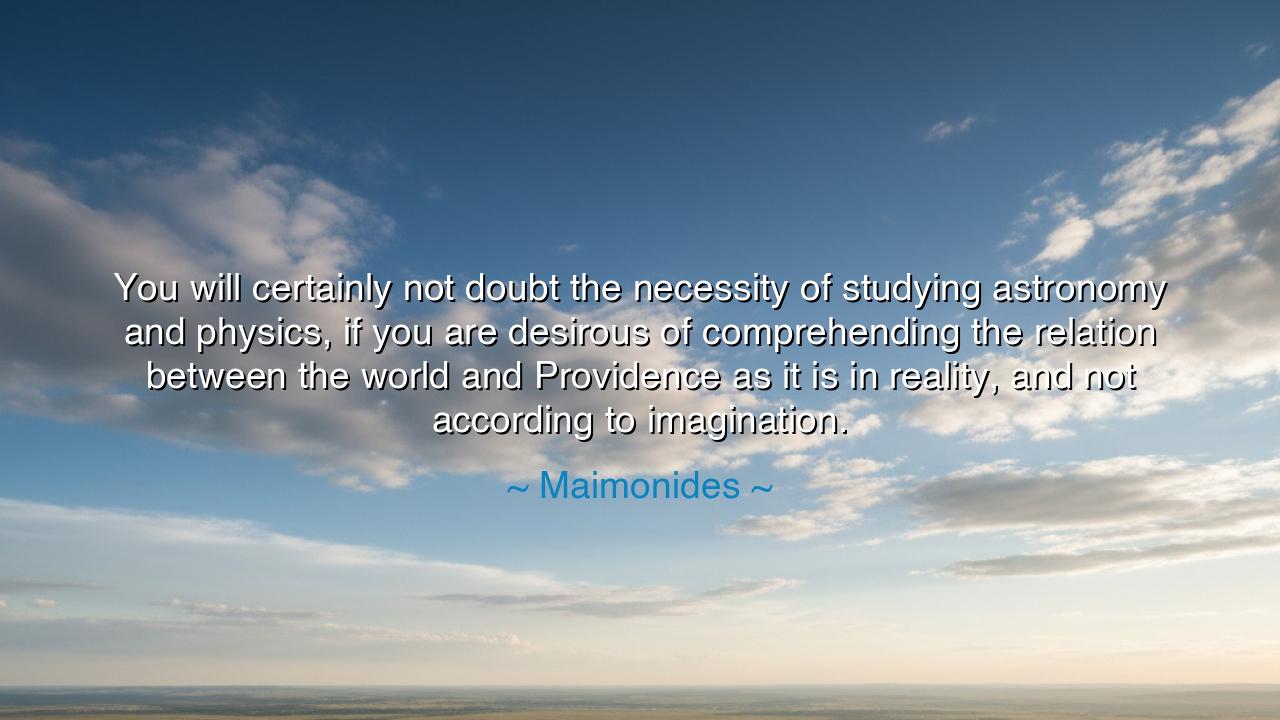
You will certainly not doubt the necessity of studying astronomy
You will certainly not doubt the necessity of studying astronomy and physics, if you are desirous of comprehending the relation between the world and Providence as it is in reality, and not according to imagination.






“You will certainly not doubt the necessity of studying astronomy and physics, if you are desirous of comprehending the relation between the world and Providence as it is in reality, and not according to imagination.” Thus spoke Maimonides, the great philosopher and physician of the twelfth century, a bridge between faith and reason, between the wisdom of the ancients and the awakening of the modern mind. In these words, drawn from his monumental work The Guide for the Perplexed, Maimonides reveals a truth of immense and eternal depth: that to know the divine, one must first seek to know the world. For Providence—the guiding will of the Creator—is not hidden in superstition or dream, but in the order of the universe, in the movements of the stars, in the harmony of natural law. To understand God rightly, one must study not merely through imagination, but through knowledge.
In Maimonides’ age, as in ours, many sought the divine through feeling alone—through visions, omens, and mystical speculation. Yet he, the wise son of Andalusia and Egypt, saw that such imagination, though powerful, was not enough. He taught that truth and faith are not enemies, but allies—that the human mind, when properly trained in the sciences, becomes an instrument of revelation. To him, astronomy and physics were not mere disciplines of curiosity, but sacred paths to understanding the Creator’s design. For how can one praise the Maker of the heavens without first learning how the heavens move? How can one perceive the perfection of divine wisdom without first seeing the perfection of nature’s laws?
Maimonides’ words arose from his deep engagement with the philosophers of Greece—Aristotle, Plato, and the thinkers of Alexandria—whose reason illuminated the paths of inquiry. Yet he refused to let reason extinguish faith. Instead, he saw in science the very language of Providence. To study the stars, he believed, was to study the handwriting of God; to understand motion, light, and matter was to glimpse the eternal harmony that sustains existence. He walked boldly between two worlds—the world of the believer and the world of the philosopher—and showed that true wisdom lies in the union of both.
Consider the story of Galileo Galilei, who lived centuries after Maimonides yet walked the same path of truth. When Galileo turned his telescope toward the sky, he beheld moons circling Jupiter, mountains upon the moon, and stars uncountable. He sought not to diminish faith, but to reveal the grandeur of creation more fully. Yet his discoveries stirred fear among those who clung to imagination over knowledge. The heavens, once thought fixed and divine, now moved in a vast cosmic dance. But Galileo, like Maimonides before him, believed that truth revealed through reason was itself an act of worship—that the laws of physics were the very voice of Providence speaking through creation.
In this way, Maimonides teaches that ignorance is not piety, and knowledge is not pride. The Creator endowed humankind with mind and curiosity so that we might rise above illusion and behold the order of truth. To rely only on imagination is to mistake shadow for light, to worship the form and miss the essence. The one who studies the cosmos, who learns the laws of nature, is not moving away from God but drawing nearer—seeing, through understanding, how every atom, every star, every breath participates in divine wisdom. To study the world rightly is to read the living scripture written not in ink, but in starlight.
O seeker of truth, hear this: faith and science are not opposing mountains, but two peaks that rise from the same earth. The path between them is steep, but those who walk it discover the vastness of both heart and mind. Let your faith give you wonder, and your reason give you clarity. Study deeply—learn the ways of the heavens, the nature of matter, the laws that bind the visible and invisible. For by knowing how the universe is woven, you will glimpse the hand that wove it.
Therefore, let this be your lesson: seek understanding with reverence, and let your imagination be guided by knowledge. Look upon the night sky not with idle awe, but with the curiosity of one who wishes to know the divine through its works. Let every discovery fill you not with arrogance, but with humility, for each new truth is another reflection of the infinite mind of God. In studying the stars and the atoms alike, we fulfill the command not to escape the world, but to comprehend it—and in doing so, we honor Providence as Maimonides did: not as a distant mystery, but as the living order that holds the universe together, visible to all who choose to see with both reason and imagination united.






AAdministratorAdministrator
Welcome, honored guests. Please leave a comment, we will respond soon